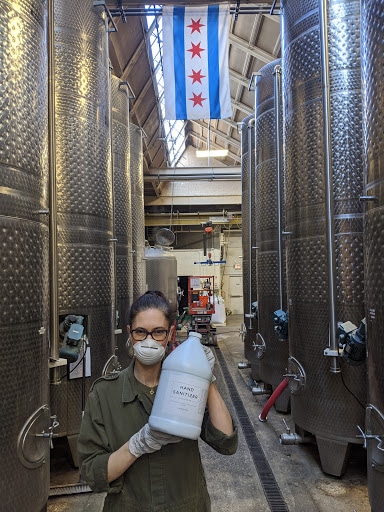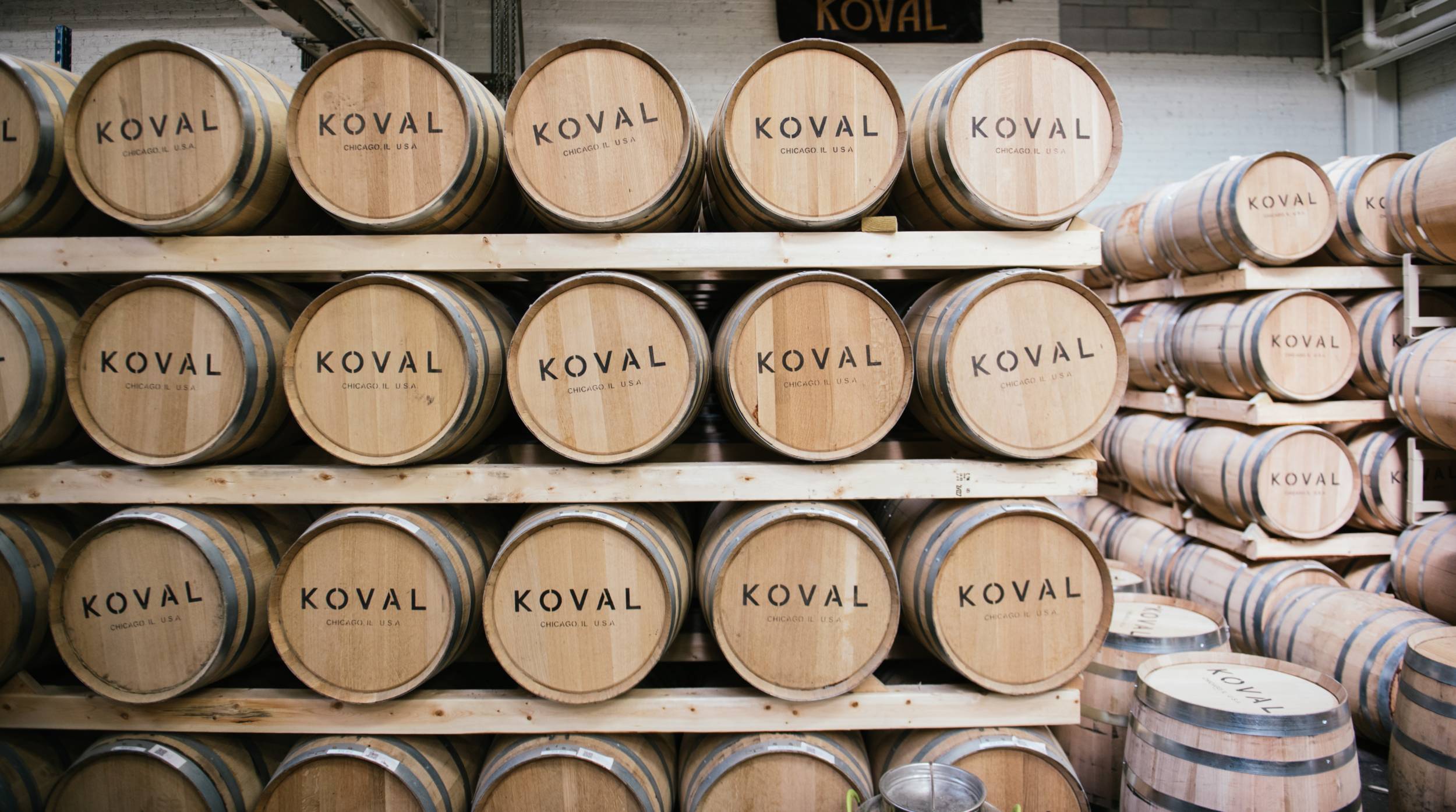Back in March, when COVID-19 started to make an impact in the US, we saw companies around the country pivot their everyday efforts to helping those most affected by COVID-19. It’s impressive and inspiring to see Chicago based companies such as Koval pioneer positive change amidst the COVID pandemic. There was a point when sanitizer was in dire need, and with a pivot in production, Koval was able to provide the necessary products to those most at risk.
Koval is a Chicago based distillery producing organic whiskey, liqueurs, and specialty spirits and is “Chicago’s first distillery since the mid-1800s.”
Hello Sonat, thank you for taking the time to chat with us. Can you describe a little bit about what inspired you to begin a distillery and what separates you from your competition?
The idea for KOVAL began to crop up while house hunting with my husband in the DC area. It was 2007, and all of the homes in our price category were a tad depressing. After leaving one with a moldy basement, we started to think that we might not want to settle down in DC after all, and perhaps, we might just want to do something completely different with our lives than what our careers were dictating. My husband was the Deputy Press Secretary for the Austrian Embassy, and I was a tenured Associate Professor. Though what we really wanted, given we were starting a family of our own, was to be close to family, in a city we loved, and to have an opportunity to do something together. Robert comes from three generations of distillers in Austria, so it was a world we understood. So, we decided to leave DC, our careers, health insurance, and 401ks to be in the city we love, Chicago. Instead of a down payment on a home, we moved in with my parents (into my brother’s old bedroom with our new baby), purchased a pot still, and in 2008, started the first distillery in Chicago since the mid-1800s.
In order for us to be able to do tours, tastings, or retail on site, I had to get the IL liquor laws changed for manufacturing of distilled spirits. It was the first time they had been changed since 1934. I worked to create the IL Craft Distillers License, which made it possible for us to do all of the things that helped us reach out to consumers and tell our story.
We believe our success has to do with a few things. First, we were steadfast in wanting to develop our own identity as a brand; and thus, we wanted to create our own style of whiskey. We did this by using a number of “alternative grains” such as oat and millet, which helped us gain recognition as “leaders of the alt-grain scene”, as per Wine Enthusiast among others. We also wanted to differentiate ourselves through our process; one that focuses on using only the “heart cut” of the distillate. The “heart cut” is the purest portion of alcohol that comes off the still. For this, we have been credited with ushering in a new style of American whiskey, which is in contrast to the common industry practice of adding “tails” to the heart cut in a barrel. Tails on their own taste and smell a bit like a wet dog, and contain Propanol, Butanol, Amyl and fusel oils, which tend to muddy the character of the hearts. Since Robert comes from three generations of brandy makers in Austria, and wanted to focus on developing a similar clean, bright, style of whiskey, we chose to use the same strict cuts that brandy makers use for fruit distillates and apply them to grain.
Another factor in our growth and success also has to be our attention to design. While we know that creating the best spirits possible is essential to our mission, they need to be packaged in a way that shows the care and attention to what is inside the bottle. In branding, we have been able to make KOVAL even more of a family business, as all of the branding is done by my sister’s internationally award-winning branding company, Dando Projects.
How was the initial reception?
In the beginning, it was difficult to get a distributor, let alone gain any popularity. We had to work on grass roots efforts to get the word out. It helped that I had managed to get the laws changed, which earned us a good bit of press. I remember taking my first son on a walk in his stroller, with the bottom filled with liquor samples, going from restaurant to restaurant, bar to bar in our neighborhood – all in an effort to get people to taste our products and hopefully place an order. As a working mother, I was always multitasking. We knew we had a good product that used fun, unique grains and little by little people started to hear about us.
Koval embraces the bottle to grain mentality. Our organizations are very similar in that we do not white or private label our products; we procure raw materials and create our own blends. There is no doubt that this is vital to remaining genuine and authentic. Can you expand more on your mission to produce grain to bottle liquor?
We always wanted to do everything ourselves, and we take great pride in being able to trace every bottle to the field on which the grain was grown. It is in part about transparency, and also about wanting to make organic products that support sustainable agriculture.
It’s impressive and inspiring to see Chicago based companies such as Koval pioneer positive change amidst the COVID pandemic. There was a point when sanitizer was in dire need, and with your pivot in production, Koval was able to provide the necessary products to those most at risk. What were the conversations like internally at Koval when deciding to begin sanitizer production?
-

Photo: Courtesy of KOVAL Distillery
It was clear that there was a need, especially on the front lines of this health crisis. We started out by wanting to make a few batches of sanitizer to donate to first responders. However, the response was overwhelming (to say the least) and we realized that there were so many trying to find these basic supplies. So we decided to completely shift all production to making sanitizer for the time being. We also launched a GoFundMe campaign to assist in our efforts to get as much out to those in need as possible. We have now donated over 4,000 gallons, while also supplying essential businesses all throughout the US.
What were the toughest roadblocks amid the transition to sanitizer production?
Even in advance of it becoming legal, we had to think about what we needed to source by way of bottles and how we would go about things as soon as we were given the go ahead. We anticipated being allowed to move forward after speaking with the TTB and our trade organization DISCUS, but couldn’t make any moves until it was official. As soon as we were allowed by the government, we completely had to shift our business, changing the way we do absolutely everything. At first, we thought we would just donate a few batches to first responders, but when the word got out, we received HUNDREDS of requests from so many on the front lines. So we enlisted help from the community through a GoFundMe campaign that has received contributions from not only fellow Chicagoans but also from all over the world. So all of a sudden we were engaging in fundraising as well as trying to adjust to all of the new realities. We had to change our website, code a new back end to our CRM to manage all of the hand sanitizer requests, figure out a protocol for categorizing requests and how we were going to get donations out. Not only were there a lot of administrative changes, we also had to change how things were done in the factory: establish new protocols for working with a caustic chemical (hydrogen peroxide) as well as a new formula, implement new safety measure to maintain social distancing and incorporate wearing masks and gloves full time. We also had to change the way we bottle to adjust for the different bottle sizes we are using for the hand sanitizer. On top of this, we also had to shift the roles of our team members and make sure they were trained on the new systems and protocols, so that we could essentially become a different business. It has been a complete shift in every way.
Did the transition to producing sanitizer help retain employees through the COVID pandemic?
Yes it definitely did.
Was liquor halted when sanitizer operations began or was the production of both run concurrently?
Yes, it was halted for four months.
What direction/s do you see Koval heading in the future?
We want to continue to expand our distribution as well as our reach in the markets we are in all over the world.
If you could give your previous self advice, what would it be?
I am not really a believer in looking back critically. I am always trying to focus on the moment and looking ahead.
What does Koval mean to Chicago?
I hope it means great locally made spirits, enjoyed at home and abroad.
